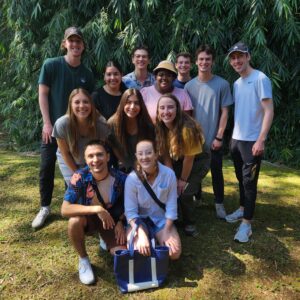 Written by special contributor Lance Fleming
Written by special contributor Lance Fleming
While most students around the country spent their Spring Break taking a break from college work and getting away from all things academia, 10 ACU students and their two professors spent a week in Costa Rica as part of the requirement for COBA’s Social Enterprise Consulting Class working with local entrepreneurs to launch products made from materials donated by Southwest Airlines.
Dr. Laura Phillips and Dr. Jennifer Golden are teaching the class this semester and took the students to Costa Rica to work with the husband-and-wife duo of Lynne Corvaglia and Chris Riquelme, who are creating “upcycled” bags and other products from leather donated by the United States’ busiest airlines.
As part of Southwest Airlines’ “Repurpose with a Purpose” program, each of the company’s fleet of airplanes is overhauled every four years, and as a part of that process, the seat leather is replaced. The leather pulled out of the planes is donated to nonprofit organizations for upcycling projects. One of the Southwest refurbishment facilities is in El Salvador, and the leather from that location has been donated to a university in Turrialba, Costa Rica, called CATIE.
CATIE is primarily an agricultural university, but it does have economic development as an area of focus.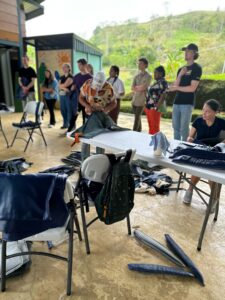 That is part of the university with which ACU students have partnered this semester. In addition to donating a warehouse full of airline seats, Southwest has also provided funds for CATIE to build a leatherworking workshop and to provide training for people in the area who are interested (primarily women). The women come from around the region to learn leatherworking and business skills.
That is part of the university with which ACU students have partnered this semester. In addition to donating a warehouse full of airline seats, Southwest has also provided funds for CATIE to build a leatherworking workshop and to provide training for people in the area who are interested (primarily women). The women come from around the region to learn leatherworking and business skills.
The idea is to create a business incubator to launch businesses as people graduate from the training program. Jobs are also being created in rural communities because CATIE receives intact seat covers that must be deconstructed before they can be upcycled into new products.
And that’s where the ACU students come in.
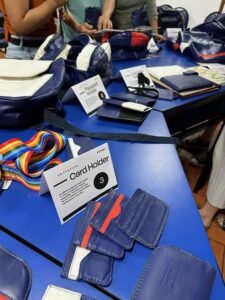 The students’ client is called Wearsos – the first business to come out of the leather project – and it was started by Corvaglia and Riquelme. Aside from upcycled bags, the company also plans to make other products like passport holders, wallets, luggage tags, and shoes, but according to Phillips, the initial launch will be with three different styles of bags.
The students’ client is called Wearsos – the first business to come out of the leather project – and it was started by Corvaglia and Riquelme. Aside from upcycled bags, the company also plans to make other products like passport holders, wallets, luggage tags, and shoes, but according to Phillips, the initial launch will be with three different styles of bags.
“Our task this year is to support Lynne and Chris as they get ready to launch their products,” Phillips said. “While we were in Turrialba, Costa Rica, we conducted focus groups with two different target markets: faculty, staff, and students on the CATIE campus, as well as Southwest Airlines employees.
“The first set of focus groups were done in person, while the Southwest Airlines focus groups were conducted via Zoom,” she said. “Our students are sorting through the information we collected through those sessions to provide marketing help to Lynne and Chris as they decide how to position the three products. That will also allow us to help them with information about shipping because they are working through the logistics of getting products from Costa Rica to the United States and Canada.”
The goal for the class, Phillips said, is to complete “one or two” consulting projects for the client, in this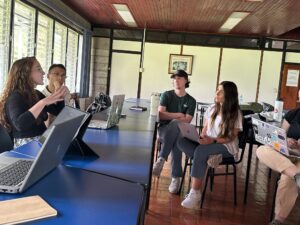 case, Wearsos. So far, in four years of teaching the class, each client has been in Costa Rica, although Philips said future classes could certainly take on a domestic client or a client in a foreign country other than Costa Rica. Phillips also said that she wants the students to learn problem-solving and critical-thinking skills each year to serve them when they enter the workforce.
case, Wearsos. So far, in four years of teaching the class, each client has been in Costa Rica, although Philips said future classes could certainly take on a domestic client or a client in a foreign country other than Costa Rica. Phillips also said that she wants the students to learn problem-solving and critical-thinking skills each year to serve them when they enter the workforce.
What the students will find, Phillips said, is that the context and scope of the project will always change between the start of the semester and the time they return from the Spring Break trip. In addition, the on-site schedule over Spring Break is always fluid, forcing students to adjust their plans, which is more difficult for some students than others.
“We want the students to become much more comfortable dealing with ambiguity and learning to be flexible, both in a project context and a general life context,” Phillips said. “We hope the students learn how to be good team members. Most students have had several group projects by this point in their college careers. In many of these cases, the work is distributed unevenly across the team, with some students pulling more than their weight and others free riding. This is an opportunity for them to work in a group where everyone wants to be involved and contribute.
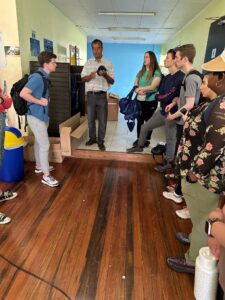 “Finally, we hope the students will learn that consulting (and any cross-cultural project) is a co-creation between the parties involved,” she said. “We do not go to Costa Rica to solve our clients’ problems or fix their issues. We work with the client to develop solutions that will work in their context. We try hard to squash the ‘savior’ complex that people in general – and Americans specifically – sometimes bring to other contexts. We also try to cultivate the idea that everyone has valuable ideas and skills to bring to the project.”
“Finally, we hope the students will learn that consulting (and any cross-cultural project) is a co-creation between the parties involved,” she said. “We do not go to Costa Rica to solve our clients’ problems or fix their issues. We work with the client to develop solutions that will work in their context. We try hard to squash the ‘savior’ complex that people in general – and Americans specifically – sometimes bring to other contexts. We also try to cultivate the idea that everyone has valuable ideas and skills to bring to the project.”
The class was not only beneficial for the entrepreneurs and partners in Costa Rica but also for the students that attended. For many, it was life-changing. Senior marketing major, Angel Smith, said, “I learned new things from a brand-new culture and was humbled by the experience. This experience has influenced my current professional goals in changing the purpose behind applying meaningful work that can serve a higher purpose. It also humbled my experience of what it means to be successful; on our trip, Dr. Eliecer Vargas, the professor at CATIE who is in charge of the leatherworking project, said that finding happiness in your worth is also finding happiness from within, not just looking for monetary value. This past semester, I have worried about finding a job that will bring financial gain, but this trip has shown me that there is value in the community you surround yourself with. Five years from now, I could see myself working for a company with a program or even starting an outreach program supporting giving back and empowering communities in need.”
Angel’s words echo the mission and values of the College of Business: As a Christian college of business and technology, we call our members to faith and vocation, learning and innovation, students and relationships, and excellence and impact. We can’t wait to see what fruit comes from the seeds that have been planted for both our partners and our students.